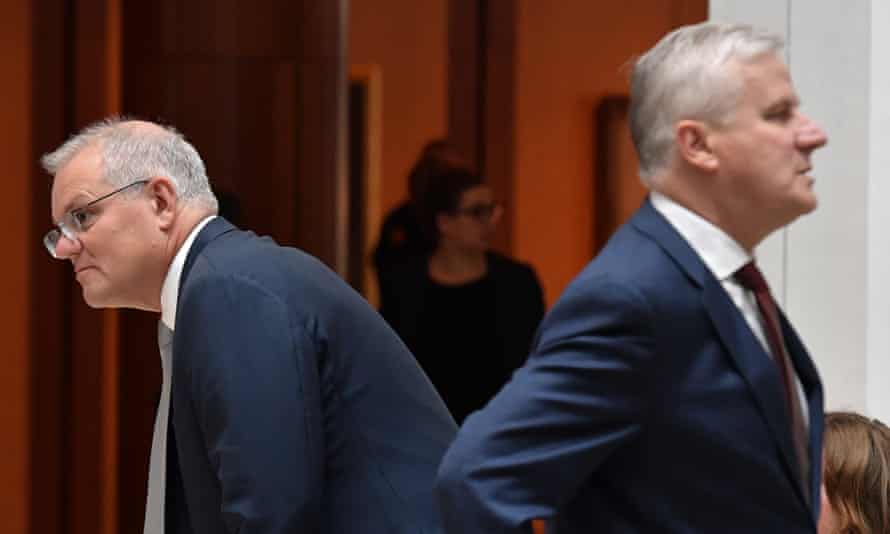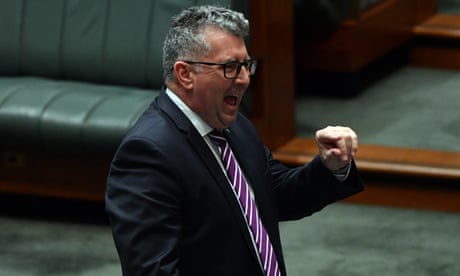Extract from The Guardian
The ‘new energy economy’ unfolding all around us is once again hostage to Australia’s gruesome, internecine climate change politics

Last modified on Sat 19 Jun 2021 06.02 AEST
On Thursday morning, shortly after the resources minister, Keith Pitt, finished his “net zero by 2050: not on your nelly” sortie on the ABC, the governor of the reserve bank, Philip Lowe, touched down in Queensland Nationals country.
Lowe went to Toowoomba to deliver a keynote address at the Australian Farm Institute conference. The speech was principally about household debt, house prices and whether Australians could ever expect a pay rise. But during the questions that followed the presentation, the RBA governor was asked about decarbonisation in the agriculture sector.
Lowe told the conference he was often up late, participating in the international meetings that central bank governors participate in “and a very frequent question that comes up in those meetings is ‘what is Australian business doing to decarbonise?’”.
It is worth letting Lowe explain. “Many international investors are very focused on this issue and it’s particularly important for the agricultural sector because up to 70% of agricultural output in Australia gets exported – so you are relying on overseas markets, and increasingly overseas investors are asking about the carbon content of production, and that is a trend that is only going to continue,” the central bank governor said.
“It is a really important issue and it’s going to become more important.”
Lowe inhabits a universe where climate change is real, the science is settled, and global capital has already made its choice.
If you inhabit that world, there’s very little grey area. You can see that transformation is coming. You can see countries are now in a race to prosper in what Scott Morrison now likes to call the “new energy economy”.
That race is only intensifying.
Over the past couple of months, the International Energy Agency has said fossil fuel expansion must end now if the planet is to address the climate crisis; there has been a G7 declaration (with Morrison in attendance) that public financing of unabated coal-fired power must stop this year and a pledge that net zero emissions must be achieved by 2050 “at the latest”; Joe Biden, Yoshihide Suga and Justin Trudeau have pledged much deeper cuts in emissions by 2030; and Boris Johnson says climate action is Britain’s top priority and the UK will deliver a 78% emissions cut by 2035 compared with 1990.
While Lowe and his financial sector colleagues inhabit the decarbonising world, and while Morrison, ever flexible, ever protean, now seems to grasp that world is non-negotiable (an epiphany that has led the prime minister to try to reboot a domestic debate that the Coalition has shamefully poisoned and weaponised for a decade to win elections), things look different if you are Keith Pitt.
Pitt, and his colleagues from regional Queensland, have told their constituents, hand on heart, that coal is king and nothing needs to change – and then Biden went and made a liar of him. After Biden vanquished Donald Trump and brought the US back into the Paris agreement, the global disposition on climate action shifted decisively.
Over this past week, while Morrison bounced from Singapore, to Cornwall, to London and Paris, Nationals MPs back home watched with growing trepidation.
During one mildly hilarious moment in London this week, Johnson, who has been entirely clear that he wants Australia to step up its climate policy ambition before Cop26 in Glasgow in November, told reporters breezily that Morrison had already “declared” for net zero by 2050. BoJo flashed a cherubic grin while the Australian prime minister’s face froze in a rictus.
Perhaps Pitt feared Morrison would race home after all the summiting, infected with G7itis, to stitch up that “declared” net zero agreement, posthaste.
In any case the resources minister took himself to the Radio National studio in Parliament House early on Thursday morning to tell Morrison what would be happening.
The resources minister said publicly what he’s been telling colleagues privately for months: Morrison might want to pivot on climate policy to placate metropolitan Liberal voters and his global peers, particularly Biden and Johnson, ahead of Glasgow.
But the prime minister can’t do that in any substantive way unless the National party agrees. Implied but not stated was: “Over our dead body, mate.”
What Pitt said on Thursday morning reflected the bolshie mood in the Nationals party room this week. As one of the resources minister’s colleagues put it to me bluntly: “Scott needed to be told to shut up.”
A boiling anger has been growing in the junior Coalition partner that Morrison has been out since Biden won the US election laying the groundwork for the government to adopt a net zero position, without asking the Nationals whether or not that was OK. “He hasn’t even bothered to have the conversation,” one Nationals MP told me this week.
While the world is moving more decisively into a climate science-adjacent position, all Morrison has done (thus far at least – I keep hoping the prime minister will prove me wrong), is plaster an aspirational sounding talking point on the status quo.
The prime minister says he wants to achieve net zero emissions as soon as possible and “preferably” by 2050. But heavily qualified aspiration isn’t action. Thus far, the official guidance is a mid-century target – assuming the Nationals can ultimately be persuaded – wouldn’t be legislated.
Also, the further Morrison tiptoes along his pivot curve, the more obvious it becomes that the prime minister’s “pivot” involves ensuring the fossil fuels industry remains tucked in snugly at the heart of the transition.
While Morrison articulates his “preference” to achieve net zero by 2050, Australia is opening up new gas basins (because gas must be the new coal before hydrogen becomes the new gas); taxpayers are building a gas peaking plant in the Hunter Valley even though the energy market operator says there are cheaper firming options; and “renewable” energy agencies are being tasked with trying to nail carbon capture and storage, because if we can crack CCS at scale, that keeps abated fossil fuels in the game for longer, so the same club of companies that prospered in the carbon economy can continue to prosper in the new energy economy.
Given all that – given Morrison is very obviously working within the constraints the National party would always impose – you might wonder why Pitt felt it necessary to shirtfront Morrison.
But there it was. Shots fired.
The Nationals leader, Michael McCormack, minding shop as acting prime minister while Morrison mingled with his global peers this week, was on song with Pitt. On a podcast with the Conversation this week, McCormack said his party would not be embracing a 2050 target as a firm commitment in the run up to Glasgow.
It’s hard, right at the moment, to say whether this no is a firm no, or whether no means “negotiate, Scott”.
It would not surprise me at all if the Nationals decided to absolutely dig in. I’ve been pointing out for months it’s a really difficult thing for the Queensland crew, who increased their margins in 2019 by telling constituents the Coalition was implacably for fluoro shirts and fossil fuels, to turn on a dime. How, exactly, do people like Pitt go home to the same electorates and say, ‘actually, we are now for net zero’ without looking like a bunch of frauds?
In any case, one thing is clear: the world of tremendous opportunity Lowe spoke about in Toowoomba, the world that is unfolding all around us, the world of science and facts and economics, is once again hostage to Australia’s gruesome, internecine climate change politics.
That reality could not be more depressing.

No comments:
Post a Comment